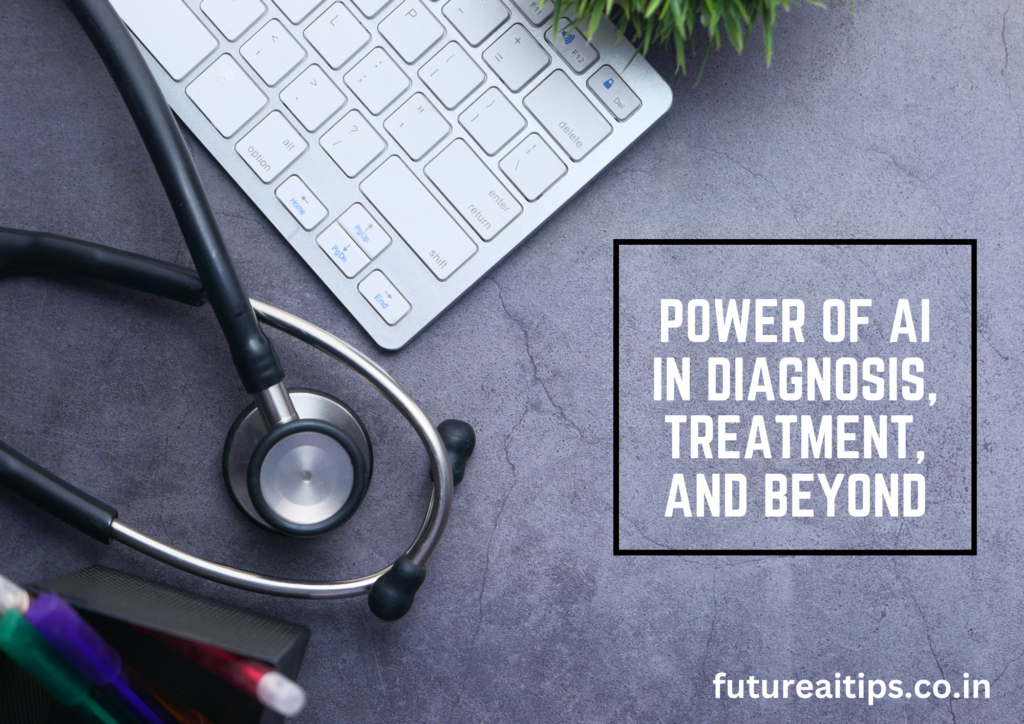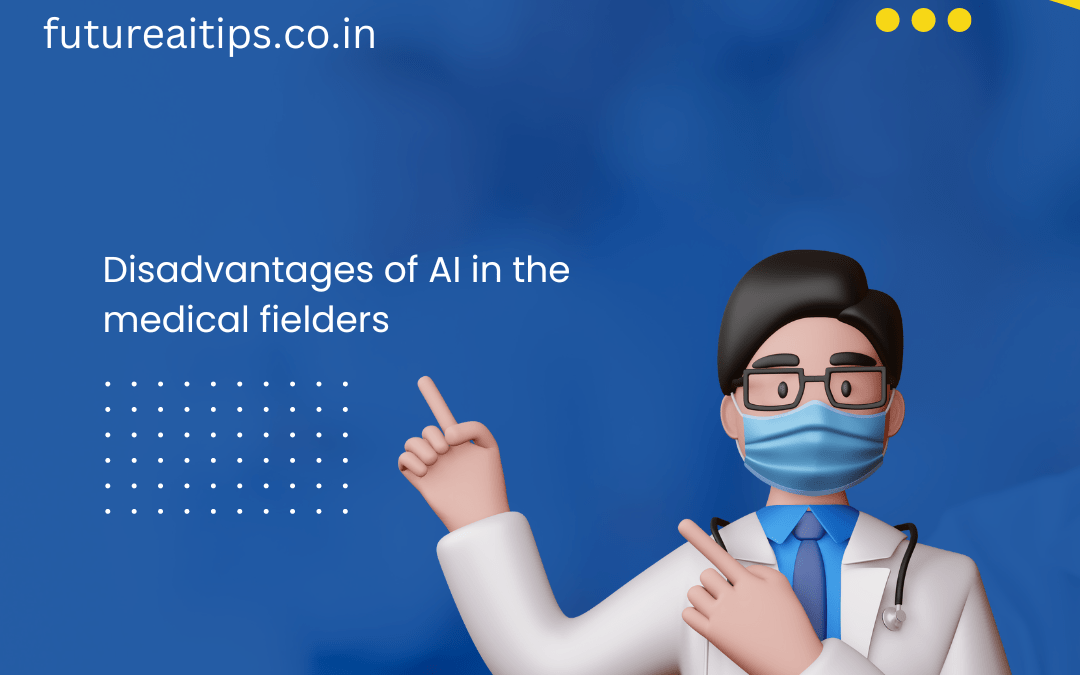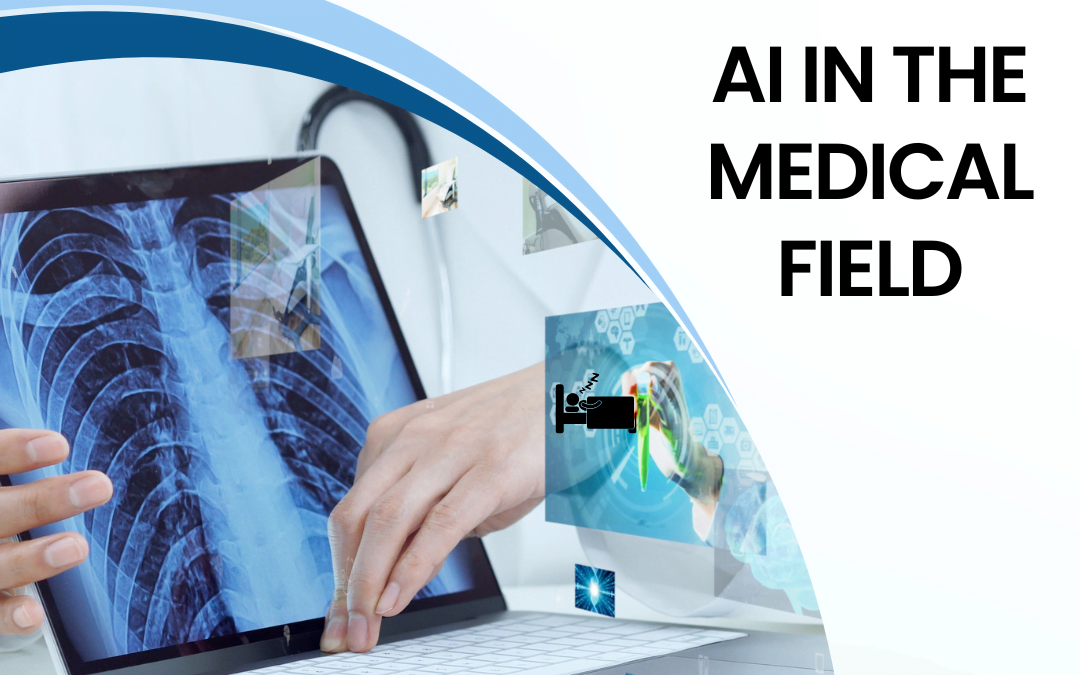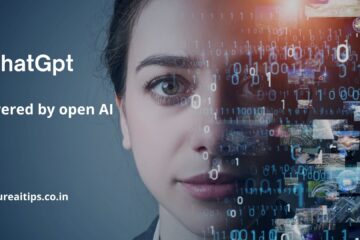AI in the medical field the Power of AI in Diagnosis, Treatment, and Beyond.
Introduction

In the dynamic realm of healthcare, the influence of artificial intelligence (AI) has emerged as a pivotal force, profoundly reshaping multiple dimensions of the industry. AI’s integration equips healthcare providers with tools to navigate evolving challenges, fostering efficiency, precision, and innovation across the spectrum. Through harnessing AI, medical professionals experience streamlined workflows, expedited diagnostics, and optimized treatment strategies. Notable areas of AI application encompass healthcare analytics, diagnostics, robotic-assisted procedures, and remote health services. This collective infusion of technological advancements promises not only heightened operational efficiency but also a potential paradigm shift in the way healthcare is conceived.
Advantages of AI in the medical field

- Augmented Diagnostic Precision: AI-driven algorithms adeptly scrutinize data, elevating diagnostic accuracy. For instance, AI-powered image analysis aids in swift and precise detection of conditions like cancer.
- Personalized Treatment Trajectories: AI adeptly harnesses patient data, culminating in tailored treatment strategies that maximize efficacy and cater to individual requirements.
- Amplified Efficiency: Through automation of repetitive tasks, AI empowers healthcare professionals to allocate more time towards patient-centric initiatives, enhancing the overall quality of care.
- Economic Optimization: AI-orchestrated efficiencies curtail healthcare expenditures by minimizing errors and simplifying intricate procedures. AI-powered chatbots extend continuous patient support, thereby enabling nurses to focus on intricate responsibilities.
- Enhanced Accessibility: AI bridges geographical healthcare disparities by facilitating virtual consultations and remote monitoring, thereby expanding the reach of healthcare services
Examples of AI Applications in Healthcare:
- Diagnostic Excellence: AI’s capacity to analyze medical imagery, process language, and learn from patterns contributes to more accurate disease diagnosis. Early detection of conditions like cancer is bolstered by AI’s image analysis capabilities.
- Treatment Tailoring: By amalgamating patient histories and genetic insights, AI customizes treatment plans to suit individual profiles, yielding more effective interventions.
- Drug Exploration: AI delves into extensive biological data to identify potential drug targets, expediting drug discovery processes.
- Surgical Precision: Real-time surgical guidance powered by AI assists surgeons during intricate procedures, advancing precision and minimizing risks.
- Remote Patient Monitoring: AI-fueled wearables enable remote tracking of vital signs, alerting healthcare providers to potential concerns promptly. AI in the medical field
Disadvantages of AI in the medical field

- Algorithmic Bias: Should AI be trained on imbalanced data, it risks perpetuating prejudiced results, disproportionately affecting marginalized communities.
- Overreliance on Autonomous Decisions: Excessive dependence on AI devoid of human oversight may result in flawed patient care judgments.
- Unauthorized Data Exploitation: Unapproved gathering and manipulation of patient data might violate privacy rights, undermining trust and faith in AI applications. AI in the medical field
- Despite its transformative potential, AI within healthcare grapples with challenges:
- Data Biases: AI algorithms may inherit biases from training data, causing disparities in diagnoses and treatments, particularly affecting marginalized groups.
- Lack of Transparency: Complex AI algorithms can be hard to interpret, leading to skepticism among healthcare professionals and complicating patient-provider communication.
- Workforce Impact: Advanced AI could automate certain tasks, potentially displacing jobs and reshaping healthcare employment dynamics.
- Security Vulnerabilities: AI systems are susceptible to breaches, compromising patient privacy and undermining the integrity of AI technologies.
- Ethical Complexities: Ethical dilemmas arise as AI decisions might inadvertently discriminate against patients or prioritize non-patient interests. AI in the medical field
Mitigating Risks and Ensuring Ethical AI:
- Bias Mitigation: Scrutiny of data and inclusive training sets aid in minimizing algorithmic bias.
- Transparency: Developing transparent AI practices and explainable algorithms fosters trust and comprehension.
- Skill Adaptation: Healthcare professionals can adapt by embracing AI tools while concentrating on value-added responsibilities.
- Robust Security Protocols: Stringent cybersecurity measures are indispensable to safeguard patient data. AI in the medical field
Conclusion:

The amalgamation of AI into the healthcare fabric unveils a dual-edged narrative, laden with potential and responsibility. The merits of AI in healthcare encompass precision diagnostics, personalized treatments, and streamlined processes, ushering patient care into an era of unparalleled efficacy and accuracy. Nevertheless, the potential drawbacks, including data biases, opacity, workforce displacement, security concerns, and ethical intricacies, underscore the need for prudent deployment and unwavering vigilance. Striking a harmonious equilibrium between AI’s potential advantages and inherent risks remains paramount. By navigating these challenges astutely, the healthcare sector can forge ahead into a future where technology assumes a transformative role, empowering both healthcare practitioners and patients on an unprecedented scale. AI in the medical field




0 Comments